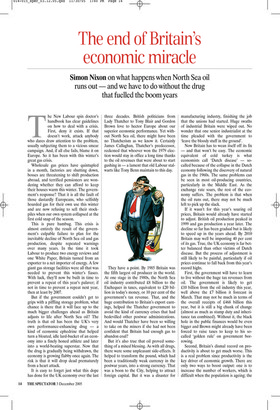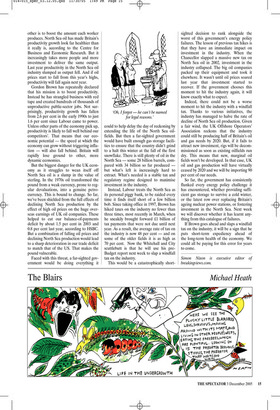The end of Britain’s economic miracle
Simon Nixon on what happens when North Sea oil runs out — and we have to do without the drug that fuelled the boom years The New Labour spin doctor’s handbook has clear guidelines on how to deal with a crisis. First, deny it exists. If that doesn’t work, attack anybody who dares draw attention to the problem, usually subjecting them to a vicious smear campaign. And, if all else fails, blame it on Europe. So it has been with this winter’s great gas crisis.
Wholesale gas prices have quintupled in a month, factories are shutting down, bosses are threatening to shift production abroad, and terrified pensioners are wondering whether they can afford to keep their houses warm this winter. The government’s response? That it is all the fault of those dastardly Europeans, who selfishly hoarded gas for their own use this winter and are now refusing to sell their stockpiles when our own system collapsed at the first cold snap of the season.
This is pure humbug. This crisis is almost entirely the result of the government’s culpable failure to plan for the inevitable decline of North Sea oil and gas production, despite repeated warnings over many years. In the time it took Labour to produce two energy reviews and one White Paper, Britain turned from an exporter to a net importer of energy. A few giant gas storage facilities were all that was needed to prevent this winter’s fiasco. With luck, they’ll now be built in time to prevent a repeat of this year’s palaver; if not in time to prevent a repeat next year, then at least by 2007.
But if the government couldn’t get to grips with a piffling storage problem, what chance is there that it will face up to the much bigger challenges ahead as Britain adjusts to life after North Sea oil? The truth is that oil has been the UK’s very own performance-enhancing drug — a kind of economic ephedrine that helped turn a bloated, idle lard-bucket of an economy into a finely honed athlete and later into a world-beating superstar. Now that the drug is gradually being withdrawn, the economy is growing flabby once again. The risk is that it will drop dead prematurely from a heart attack.
It is easy to forget just what this dope has done for the UK economy over the last three decades. British politicians from Lady Thatcher to Tony Blair and Gordon Brown love to hector Europe about our superior economic performance. Yet without North Sea oil, there might have been no Thatcherism as we know it. Certainly James Callaghan, Thatcher’s predecessor, reckoned that whoever won the 1979 election would stay in office a long time thanks to the oil revenues that were about to start gushing in — a lament that old Labour stalwarts like Tony Benn maintain to this day.
They have a point. By 1985 Britain was the fifth largest oil producer in the world. At one stage in the 1980s, the North Sea oil industry contributed £8 billion to the Exchequer in taxes, equivalent to £20 billion in today’s money, or 10 per cent of the government’s tax revenue. That, and the huge contribution to Britain’s export earnings, helped the Thatcher government to avoid the kind of currency crises that had bedevilled other postwar administrations. And would Thatcher have been so willing to take on the miners if she had not been confident that Britain had enough gas to abandon coal?
But it’s also true that oil proved something of a mixed blessing. As with all drugs, there were some unpleasant side-effects. It helped to transform the pound, which had been a traditionally weak currency in the postwar years, into a strong currency. That was a boon to the City, helping to attract foreign capital. But it was a disaster for manufacturing industry, finishing the job that the unions had started. Huge swaths of industrial Britain were wiped out. No wonder that one senior industrialist at the time pleaded with the government to ‘leave the bloody stuff in the ground’.
Now Britain has to wean itself off its fix — and that won’t be easy. The economic equivalent of cold turkey is what economists call ‘Dutch disease’ — socalled because of the collapse in the Dutch economy following the discovery of natural gas in the 1960s. The same problems can be seen in most oil-producing countries, particularly in the Middle East. As the exchange rate soars, the rest of the economy suffers. The problem is that when the oil runs out, there may not be much left to pick up the slack.
If it wasn’t for this year’s soaring oil prices, Britain would already have started to adjust. British oil production peaked in 1999 and gas production a year later. The decline so far has been gradual but is likely to speed up in the years ahead. By 2010 Britain may well be importing 40 per cent of its gas. True, the UK economy is far better balanced than other victims of Dutch disease. But the process of adjustment is still likely to be painful, particularly if oil prices continue to fall back from this year’s record highs.
First, the government will have to learn to live without the huge tax revenues from oil. The government is likely to get £10 billion from the oil industry this year, well above the £7 billion it forecast in March. That may not be much in terms of the overall receipts of £468 billion this year, but it is still a big chunk of change (almost as much as stamp duty and inheritance tax combined). Without it, the black hole in the public finances would be even bigger and Brown might already have been forced to raise taxes to keep to his socalled ‘golden rule’ on government borrowing.
Second, Britain’s dismal record on productivity is about to get much worse. This is a real problem since productivity is the key driver of economic growth. There are only two ways to boost output: one is to increase the number of workers, which is difficult when the population is ageing; the other is to boost the amount each worker produces. North Sea oil has made Britain’s productivity growth look far healthier than it really is, according to the Centre for Business and Economic Research. But it increasingly takes more people and more investment to deliver the same output. Last year productivity in the North Sea oil industry slumped as output fell. And if oil prices start to fall from this year’s highs, productivity will fall again next year.
Gordon Brown has repeatedly declared that his mission is to boost productivity. Instead he has strangled business with red tape and created hundreds of thousands of unproductive public-sector jobs. Not surprisingly, productivity growth has fallen from 2.6 per cent in the early 1990s to just 1.6 per cent since Labour came to power. Unless other parts of the economy pick up, productivity is likely to fall well behind our competitors’. That means that our economic potential — the speed at which the economy can grow without triggering inflation — will also fall behind. Britain will rapidly lose ground to other, more dynamic economies.
But the biggest danger for the UK economy as it struggles to wean itself off North Sea oil is a slump in the value of sterling. In the 1970s oil transformed the pound from a weak currency, prone to regular devaluations, into a genuine petrocurrency. This is bound to change. So far, we’ve been shielded from the full effects of declining North Sea production by the effect of high oil prices on the huge overseas earnings of UK oil companies. These helped to cut our balance-of-payments deficit by about 1.5 per cent in 2003 and 0.8 per cent last year, according to HSBC. But a combination of falling oil prices and declining North Sea production would lead to a sharp deterioration in our trade deficit to match that of the US. That makes the pound vulnerable.
Faced with this threat, a far-sighted government would be doing everything it could to help delay the day of reckoning by extending the life of the North Sea oilfields. But then a far-sighted government would have built enough gas storage facilities to ensure that the country didn’t grind to a halt this winter at the fall of the first snowflake. There is still plenty of oil in the North Sea — some 28 billion barrels, compared with 34 billion so far produced but what’s left is increasingly hard to extract. What’s needed is a stable tax and regulatory regime designed to maximise investment in the industry.
Instead, Labour treats the North Sea as its personal piggy bank, to be raided every time it finds itself short of a few billion bob. Since taking office in 1997, Brown has hiked taxes on the industry no fewer than three times, most recently in March, when he sneakily brought forward £1 billion of tax payments that were not due until next year. As a result, the average rate of tax on the industry is now 48 per cent — and on some of the older fields it is as high as 70 per cent. Now the Whitehall and City scuttlebutt is that he will use his preBudget report next week to slap a windfall tax on the industry.
This would be a catastrophically short sighted decision to rank alongside the worst of this government’s energy policy failures. The lesson of previous tax hikes is that they have an immediate impact on investment in the industry. When the Chancellor slapped a massive new tax on North Sea oil in 2002, investment in the industry collapsed. The big oil companies packed up their equipment and took it elsewhere. It wasn’t until oil prices soared last year that investment started to recover. If the government chooses this moment to hit the industry again, it will know exactly what to expect.
Indeed, there could not be a worse moment to hit the industry with a windfall tax. Thanks to various initiatives, the industry has managed to halve the rate of decline of North Sea oil production. Given a fair wind, the UK Offshore Operators’ Association reckons that the industry could still be producing half of Britain’s oil and gas needs by 2020. But, if it fails to attract new investment, rigs will be decommissioned as soon as existing oilfields run dry. This means that new, marginal oil fields won’t be developed. In that case, UK oil and gas production will have virtually ceased by 2020 and we will be importing 90 per cent of our needs.
So far, the government has consistently flunked every energy policy challenge it has encountered, whether providing sufficient gas storage to survive a cold winter, or the latest row over replacing Britain’s ageing nuclear power stations, or fostering investment in the North Sea. Next week we will discover whether it has learnt anything from this catalogue of failures.
If Brown goes ahead and slaps a windfall tax on the industry, it will be a sign that he puts short-term expediency ahead of the long-term health of the economy. We could all be paying for this error for years to come.
Simon Nixon is executive editor of breakingviews.com.




























































 Previous page
Previous page